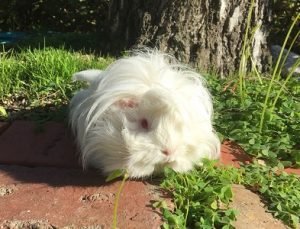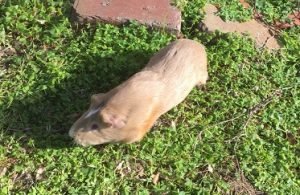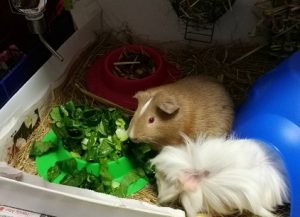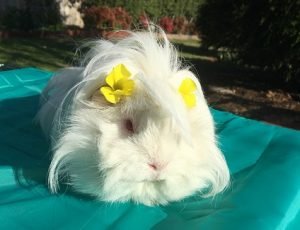Natural Feeding for Healthy Guinea Pig Pets
 Guinea pigs love to eat and will ‘wheek’ for food. Unlike most rodents which are omnivores, guinea pigs are strict vegetarians. Hence, good nutrition and plays a vital part in ensuring their overall good health and wellbeing. The ‘Hay and Veggie Diet’ for guinea pigs consists of predominantly hay and a large varied selection of leafy greens and vegetables every day. This diet is high in fibre for optimal digestive tract function, as well as to help in wearing down of their teeth. Following this guinea pig diet is the most natural way to feed your guinea pig.
Guinea pigs love to eat and will ‘wheek’ for food. Unlike most rodents which are omnivores, guinea pigs are strict vegetarians. Hence, good nutrition and plays a vital part in ensuring their overall good health and wellbeing. The ‘Hay and Veggie Diet’ for guinea pigs consists of predominantly hay and a large varied selection of leafy greens and vegetables every day. This diet is high in fibre for optimal digestive tract function, as well as to help in wearing down of their teeth. Following this guinea pig diet is the most natural way to feed your guinea pig.
The five essential elements to a guinea pig’s diet are:
Hay and Grass
 Fresh pasture hay or grass hay should form the majority of a guinea pig’s diet, e.g. oaten hay and timothy hay. Your guinea pig should have access to hay at all times and require about a litter tray of hay each day. Any uneaten hay should be removed daily, as guinea pigs will also use it to toilet in.
Fresh pasture hay or grass hay should form the majority of a guinea pig’s diet, e.g. oaten hay and timothy hay. Your guinea pig should have access to hay at all times and require about a litter tray of hay each day. Any uneaten hay should be removed daily, as guinea pigs will also use it to toilet in.
Fresh grass is also a really important part of their diet, so letting your guinea pigs roam on the lawn in a safe outdoor enclosure not only provides them with a good source of fibre, it allows alleviates boredom and allows them to explore. Please do make sure that the grass has not been sprayed with any chemicals, e.g. weed killer though.
Lucerne hay is alfalfa and not grass hay, so unsuitable for guinea pig diet. Please also ensure not to provide straw as food as it has no nutritional value. Straw if fine to use as bedding if desired.
Leafy Greens and Vegetables
 Up to 20% of a guinea pig’s diet should consist of fresh, green leafy vegetables. This equates to roughly 2 cups of veggies per 1kg of guinea pig per day. Veggies need to be washed before being fed to the guinea pigs.
Up to 20% of a guinea pig’s diet should consist of fresh, green leafy vegetables. This equates to roughly 2 cups of veggies per 1kg of guinea pig per day. Veggies need to be washed before being fed to the guinea pigs.
Healthy and safe vegetables for guinea pigs include:
- Asian greens, e.g. bok choy – our guinea pigs tend to be fussy (esp. Popcorn, the white Abyssinian) and tend to eat only the leafy part and leave the rest.
- Kale – super nutritious, contains vitamin C and is a favourite of our guinea pigs.
- Herbs, e.g. mint, coriander and parsley – our guinea pigs prefer coriander and parsley.
- Green part of carrot tops – our guinea pigs only like the tops of baby carrots.
- Celery leaves
- Leaves from broccoli and cauliflower
- Dark coloured lettuces and purple lettuces – our guinea pigs love the purple variety. Preferably do not feed them iceberg lettuce, as it has no nutritional value to them and has high water content (which can cause upset tummies). Cucumber much like iceberg lettuce does not provide any nutritional value, though it contains a small amount of vitamin C. It is high in water content and can also cause upset tummies in guinea pigs, however the odd slice now and then does them no harm. Our guinea pigs for whatever reason, do like eating it though.
- Spinach – our guinea pigs refuse to eat them, Browny our brown short-haired cavy is positively against it. We have given them salad mixes and proceeded to witness them pick them up and toss them out of the bowl – guinea pigs are amusing to watch!
- Silver beet – our guinea pigs did not take to them.
Fortified Food and Pellets
Specially formulated guinea pig pellets that are age appropriate provide guinea pigs with the essential vitamins and minerals required for optimal health, including stabilised vitamin C. Guinea pigs need on average 1-2 heaped tablespoons of good quality pellet mix per day, e.g. Oxbow.
Poorer quality pellets tend to be higher in fat content and are very sweet, as they consist of Lucerne hay and seeds. Also guinea pig mixes that look like bird seeds are unhealthy for guinea pigs and products that contain molasses cause guinea pigs gastrointestinal problems.
Treats
It is really rewarding to be able to hand feed guinea pigs. Providing treats helps during bonding and play time with your guinea pigs. Treats are to be provided in minimal amounts of no more than 1 heaped tablespoon per 1kg of guinea pig per day.
Safe treats to feed your guinea pigs include commercially produced fruit and veggie baked treats, e.g. Oxbow Simple Rewards, which our short-haired guinea pig Browny loves! She ‘wheeks’ for it daily. A range of fresh fruit and veggies can also be offered as treats, such as:
- Squash
- Carrots
- Capsicum (green or red) – Browny our brown short-haired cavy particularly likes the red variety. Red capsicums contain the highest vitamin C content, which is important for their diet. Like humans, guinea pigs cannot produce their own vitamin C.
- Peach
- Apple
- Papaya
- Mango
- Kiwi fruit
- Pear
- Pineapple
- Strawberries – Popcorn and Browny love to be held and hand fed strawberries. It will stain Popcorn’s white hair temporarily and we just gently wipe it.
- Blackberries
- Raspberries
- Cranberries
- Cherries
- Edible flowers (organically grown and free from chemical sprays), e.g. roses, pansies, snap dragons from the garden
Water
Fresh clean water is necessary at all times. Small drip bottles are best at keeping the water clean. The water bottles will need regular checks to ensure that they are leak-proof. With all three of our water bottles, there would be a little residual leak after the guinea pigs had drunk from them. To prevent the bedding getting wet, we have placed a thin brick tile to absorb any drips and has worked well. Until your guinea pigs have been trained to drink from water bottles, continue to supply water in a heavy ceramic bowl. This bowl will need to be monitored, as guinea pigs can toilet in them as well.
 As guinea pigs are creatures of habit, any changes to their diet will need to be introduced slowly. It is best to introduce green foods first, one at a time. If any soft stools are noticed, then it does not agree with your guinea pig and needs to be removed from their diet. Similarly, introduce other vegetables and fruits one at a time and in small amounts. Again, if any soft stools are present then remove the disagreeable item from your guinea pigs’ diet. The amount of feed required can vary between individual guinea pigs, as the can have different levels of appetite, so the amounts mentioned serve as a guide. Our guinea pigs tends to eat more than prescribed and will ‘wheek’ very loudly for food if need. Also short haired Browny eats more than Popcorn. They have both been checked by the vet and are happy healthy guinea pig pets.
As guinea pigs are creatures of habit, any changes to their diet will need to be introduced slowly. It is best to introduce green foods first, one at a time. If any soft stools are noticed, then it does not agree with your guinea pig and needs to be removed from their diet. Similarly, introduce other vegetables and fruits one at a time and in small amounts. Again, if any soft stools are present then remove the disagreeable item from your guinea pigs’ diet. The amount of feed required can vary between individual guinea pigs, as the can have different levels of appetite, so the amounts mentioned serve as a guide. Our guinea pigs tends to eat more than prescribed and will ‘wheek’ very loudly for food if need. Also short haired Browny eats more than Popcorn. They have both been checked by the vet and are happy healthy guinea pig pets.
Guinea pigs are inquisitive and clever animals, so add variety to the way food is offered; e.g. in a bowl, hanging off the side of the cage, in a kebab, hiding in cardboard paper rolls and use your imagination. Also re-arrange the location of feeding bowls, hay racks, water bottles and other items. The guinea pigs will not only be fed, but also entertained with these boredom busters.
Enjoy the guinea pig’s healthy vegetarian diet!
